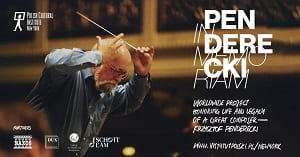Throughout the spring of 2021, the Polish Cultural Institute New York (PCINY) will curate “Krzysztof Penderecki in Memoriam,” honoring the life and legacy of Poland’s greatest modern composer. Leading up to and beyond 29 March 2021, marking the one-year anniversary of Krzysztof Penderecki’s death, the Polish Cultural Institute New York—in partnership with the Ludwig van Beethoven Association, Crossover Media, DUX Records, Lincoln Center, Naxos of America, and Schott Music publishers—will celebrate Penderecki’s life and legacy across an array of worldwide media outlets and concert venues.
PCINY’s head of music programming, Anna Perzanowska, who worked with Maestro Penderecki for over a decade, has been the driving force behind ‘Krzysztof Penderecki in Memoriam’ since the composer’s death on March 29, 2020, at his home in Kraków, Poland. “The passing of Professor Penderecki was a deeply moving loss and a shock to all who knew him personally as well as to those who admired his work. The loss was especially poignant due to the world’s Covid-19 isolation – and I was overwhelmed by the response and eagerness of all the artists who wanted to be involved and honor his memory,” comments Perzanowska.
Event Highlights
- Penderecki in Memoriam Podcast (21 March – 1 April 2021) with in-depth interviews with artists and close collaborators
- Live radio broadcasts and rebroadcasts of archived performances
- Live-streamed concerts (21 March @ Warsaw Philharmonic, 26 March @ Szczeczin Philharmonic and 1 April @ Warsaw Philharmonic) covering a broad presentation of the composer’s prolific oeuvre. Concerts from the 2021 25th Jubilee Anniversary of the Ludwig van Beethoven Easter Festival, “Beethoven and Penderecki. The Sphere of Sacrum”, will also be streamed live at the Lincoln Center.
[Sources: instytutpolski.pl, polmic.pl, ]
